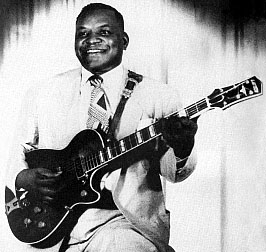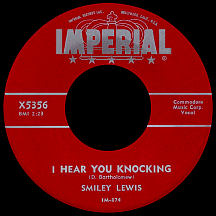SMILEY LEWIS
I Hear You Knocking
Burly, big-voiced New Orleans-based guitarist Overton Amos Lemons enjoyed the most successful period of his career at an age well beyond that of his contemporaries. With a booming baritone that didn't necessarily require the use of a microphone, the forty-something Lemons, familiar to music fans as Smiley Lewis, seemed to exist in the shadow of a similar Crescent City singer, piano man Fats Domino. That they both were on the roster of Imperial Records, had started within a few months of one another, were produced by Dave Bartholomew, who also wrote much of their material, and recorded exclusively at Cosimo Matassa's now-famous J&M studio with the same group of local session musicians, might indicate an equal shot at stardom. Domino, as is commonly known, achieved international acclaim while straying very little from the city he lived in and loved. Lewis, on the other hand, put in a great deal of effort for a relatively limited return.
As a teenager Smiley moved to New Orleans from DeQuincy, near Lake Charles, on the western end of Louisiana. He worked as a street singer in the French Quarter in the early 1930s, then joined trumpeter Thomas Jefferson's band around 1935. At 22 he was already married and well on his way to raising and rearing a large family. His "Smiley" nickname came about as a joke, because he had bad teeth (a dentist took care of the problem once he started making money from his music). In the mid-1940s he formed a band with pianist Isidore "Tuts" Washington (also a former member of Jefferson's group) and drummer Herman Seale. One single was recorded at J&M in 1947 for the New Jersey-based DeLuxe label: "Turn on Your Volume, Baby," backed with "Here Comes Smiley," both standard (and very similar) blues songs credited to Smiling Lewis, bypassed drums but featured Papa John Joseph on bass.
Smiley didn't make another record until 1950 when Bartholomew, fresh off producing Domino's debut disc ("The Fat Man"), felt the older bluesman had similar hit potential. Dave, seven-plus years younger than Smiley, had known him for years, having grown up in the same New Orleans neighborhood. "Tee-Nah-Nah" by Smiley Lewis and his Sextet (presumably the trio plus an added horn section) was spun frequently on WWEZ in the spring of '50 by jive-talking (and very popular) deejay Dr. Daddy-O (Vernon Winslow), making it a hit in southern Louisiana but almost nowhere else. Imperial released a series of solid Smiley-penned singles in '50 and '51 including "Slide Me Down" and "Bee's Boogie." In summer 1952 a collaboration of Lewis and Bartholomew titled "The Bells Are Ringing" became the big man's first to show up (if only briefly) on the national R&B charts. A softer-than-usual number, it bore, perhaps, the closest resemblance yet to Domino's hits (he'd had four or five by then); as the biggest thus far for Smiley, it prompted an iffy adjustment.
The singles of 1952 and '53, for the most part, were Bartholomew compositions and arrangements a mere degree to the left or right of Domino's hits (which were usually joint Dave-and-Fats concoctions), a likely reason for chart inaction; the worst offender, "Caldonia's Party," was a rhythmic retread of Domino's "Fat Man." Lewis was still writing his own material, but none of it was used. A tune from the pen of fiddlin' country sax man Link Davis, "Big Mamou," gave Smiley Lew a better shot, but it too failed to sell outside the Lower Mississippi region. "Blue Monday" ('I've got to get my rest, 'cause Monday is a mess!') would seem to be a hit, at least among the working class alluded to in the lyrics. "Jailbird," a bold dissertation on domestic abuse that didn't come off as humorous as intended, had the odds stacked against its success. "Real Gone Lover" found the band in fine form. Still, nothing Smiley tried worked.

Five years into his Imperial contract, Lewis hit pay dirt. "I Hear You Knocking" ('...but you can't come in!'), penned by Barthomew and featuring soon-to-be hitmaker Huey Smith on piano, landed right in the midst of R&B's surge during the rock and roll frenzy of 1955; a handful who reaped big benefits include established acts like Domino ("Ain't it a Shame") and Ray Charles ("I've Got a Woman"), in addition to relative newcomers Etta James ("The Wallflower"), Nappy Brown ("Don't Be Angry"), Bo Diddley ("Bo Diddley") and Chuck Berry. Smiley Lewis was part of that winning class of '55. His "Knocking" single spent the final four months of the year in the R&B top ten and peaked at number two (Berry's motorvatin' monster "Maybellene" and The Platters' breakthrough "Only You" took turns blocking it from the top spot in October). While some of these R&B hits impacted the pop charts, "I Hear You Knocking" faced insurmountable competition from an unlikely source: actress Gale Storm of My Little Margie sitcom fame, who'd performed in various musical films of the '40s, kicked off a two-year string of hits with an astoundingly popular cover of the song. The juxtaposition of Smiley's big, booming non-invitation and Miss Storm's housewifey don't-crash-my-Tupperware-party delivery would make for one of the weirdest mashups, should anyone want to try mixing the unmixable.
Anyway, Smiley was on the map, finally in position to extend success the way Ray, Etta, Bo and Chuck ultimately did, or at least squeeze himself comfortably into the shadow of N.O.'s favorite Fat Man. Two minor hits kept him going in '56: "One Night" ('...of sin...is what I'm now paying for...') racked up decent sales and airplay despite sensitive (and semi-scandalous) lyrics. "Please Listen to Me," a romantic plea with a punchy delivery, was a top ten airplay track. Both were conceived by Bartholomew and a new collaborator, wife Pearl King. At this point Smiley had no reason to frown, yet he never crossed over to the pop charts, which had become the priority of nearly every black singer of the era.
Adding to Overton's frustration, Domino turned "Blue Monday" into one of his biggest pop hits (in early '57), Elvis Presley scored with a lyrically toned-down "One Night" (in late '58) and Little Richard took radio by storm with "Keep A-Knockin'," a thinly-veiled (but oh-so-agreeably frantic) variation on Smiley's signature hit. Probably the closest Lewis ever came to the so-called "crossover" success (or to put it another way, a chance for white people to actually hear one of his songs) was when "Shame, Shame, Shame," his uptempo rocker from late '56 (by little-known songwriters Ken Hopkins and Ruby Fisher), was featured in director Elia Kazan's quadruple-Oscar-nominated Baby Doll (starring Best Actress contender Carroll Baker).
Several more good (but largely formulaic) singles came out through 1960 (including one on the short-lived Imperial subsidiary label Knight), at which time label boss Lew Chudd cut Smiley loose. As if lifted from any perceived trespassing on his former labelmate's territory, Domino finally released "I Hear You Knocking" in 1961 (he'd recorded the song in '58) and had a minor hit with it. Functioning far below headliner status, even in his home town, Lewis spent the next few years without any band of his own, opening shows for other Big Easy artists. He made some one-off 45s, starting with the exuberant "Tore Up" on Okeh in '62, followed by "I Wonder" on Dot in '64 and a remake of "The Bells Are Ringing," credited to the Smiley Lewis Band (suggesting he'd put a combo together, an unlikely development), on Loma in '65. In October 1966, cancer took his life at the much-too-early age of 53.
By 1970, Smiley Lewis had somehow become lost in the abyss of bygone blues shouters and early rockers, though his eventually-recognized rock classic "I Hear You Knocking" hadn't completely faded away thanks to Storm, Domino and "didn't some other guy do it too?" half-remembrances. Then Welsh rocker Dave Edmunds hit the scene with a number one U.K. remake of Smiley's great hit; a few months later it entered the U.S. top ten. Over the song's instrumental bridge, Edmunds shouted out to some of the early R&R stars (Fats, Chuck, Huey) and in the middle somewhere he slipped in the name so mysterious to many of us: 'Smiley Lewis!'...and credit was given where credit was due.


